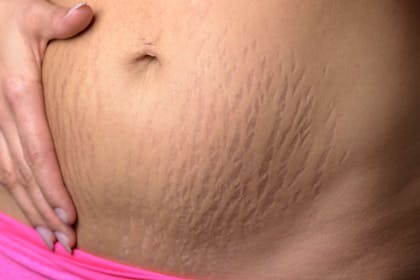Pregnancy stretch marks: what you need to know

Stretch marks are a common side-effect of pregnancy. Here's everything you need to know about what causes them, what they look like, treatments, and whether you can prevent stretch marks when you're pregnant.
What are pregnancy stretch marks?
Stretch marks are narrow streaky lines that can appear on your skin during periods of sudden growth or weight gain.
Depending on your skin colour they can be pink, red, purple or brown and may be indented or feel rippled. Overtime they usually fade to a paler, silvery colour.
Stretch marks, also known as striae, are very common in pregnancy. According to the NHS, around eight in 10 women will get stretch marks when they're pregnant. While they may be slightly itchy at first, stretch marks are harmless and won't cause any medical problems.
FREE NEWBORN NAPPIES
Many pregnant women and new mums embrace their stretch marks, calling them tiger stripes, and celebrating them as a sign of the amazing things our bodies can do.
What causes pregnancy stretch marks?
Stretch marks happen when the middle layer of your skin (the dermis) is stretched and becomes torn in places.
It's not just pregnant women who get stretch marks, they can also appear during puberty or when someone gains or loses a lot of weight.
You may be more prone to stretch marks during pregnancy, though, as hormones can soften the fibres of your skin making it more likely to tear.

Where do you get pregnancy stretch marks?
Pregnancy stretch marks often appear on your tummy as your bump grows. Other common places to get them include on your breasts, thighs and bottom.
Everybody is different though, so it's impossible to say where, or if, you'll get pregnancy stretch marks.
Which week do you get stretch marks in pregnancy?
There's no specific time when women will get stretch marks in pregnancy – if your skin is naturally more elastic, you may not even get them at all.
However, many women find that stretch marks appear in the third trimester and towards the end of the second trimester, when bump growth and weight gain is happening rapidly.
Can you prevent pregnancy stretch marks?
No. Unfortunately, there's no guaranteed way to prevent stretch marks during pregnancy. Whether or not you get them is mainly down to genetics – if your mum had them then you may do, too. There are a few things that may make getting stretch marks less likely though:
Healthy weight gain
You're more likely to get stretch marks if you gain more weight than average when you're pregnant.
Every woman gains a different amount of weight during pregnancy and this can vary massively. However, the NHS says the average weight gain is 10 to 12.5kg (around one-and-a-half to two stone).
While you shouldn't go on a weight-loss diet when you're pregnant, eating a healthy, balanced diet can help you gain weight steadily, which can reduce the chance of getting stretch marks. More importantly, eating well and getting gentle exercise has lots of health benefits for both you and your baby.
Stretch mark oil, masks, creams and lotions
Many women swear by oils, creams and beauty products that claim to prevent stretch marks, however there's little evidence to prove they work. This is because they usually only target the top layer of your skin, rather than the dermis.
There's no harm in using creams, oils or lotions though. They can make your skin feel more soft and supple, and massaging your bump can help you feel connected to your baby and your changing body.
Bio Oil is one of the best stretch mark oils on the market. As well as helping your skin to feel smoother and more supple it also helps to fade stretch marks if they do appear. See more details here at Boots.
We also like this stretch mark prevention kit by Secret Saviours. See more details here at Amazon.
Inspired by celebs like Rochelle Humes and Kelly Rowland, some women use belly masks on their pregnant stomachs too. These are much like face masks, but for the tummy. It's thought they help soothe itching and inflammation, while reducing the appearance of stretch marks.
Can you get rid of pregnancy stretch marks?
No. While you can't get rid of pregnancy stretch marks completely, they will start to fade after you have your baby and often become almost unnoticeable over time.
While there's not much evidence to suggest that stretch mark oils and creams work, the following stretch mark treatments could have some effect:
- Retinoid creams, including tretinoin, or hyaluronic acid. The NHS says these may help if used on new stretch marks. However, retinoid and tretinoin creams should NOT be used if you're pregnant as they contain vitamin A, which could harm your unborn baby.
- Laser therapy or light treatments. While they won't remove stretch marks completely, light and laser treatments could help marks fade. You would need to pay for this treatment privately as it's not available on the NHS and in most cases won't be suitable during pregnancy.
- Make-up. If you feel self-conscious about the appearance of your stretch marks, you could try covering them with make-up.
Stretch marks, scans , birth and bumps... chat all things pregnancy with other mums-to-be in the forum below …




